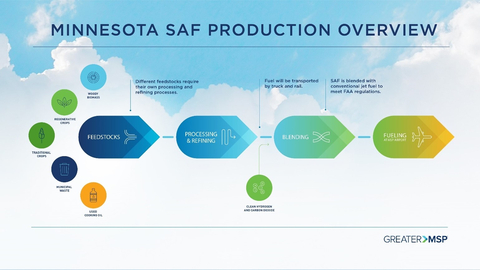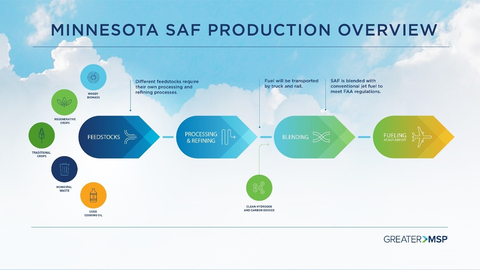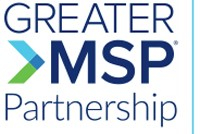ST. PAUL, Minn.--(BUSINESS WIRE)--GREATER MSP Partnership, in collaboration with Bank of America, Delta Air Lines, Ecolab, Xcel Energy and other leading stakeholders today announced major developments and celebrated a year of accomplishments toward operating the first large-scale, end-to-end sustainable aviation fuel (SAF) value chain in the United States.
SAF is a safe and certified alternative jet fuel that can reduce lifecycle carbon emissions of jet fuel by more than 80%1. Neat SAF is produced using renewable feedstocks including agricultural biomass, woody biomass, hydrogen, continuous living cover crops, and used cooking oil and is a drop-in replacement for regular jet fuel, known as Jet A. Current certification standards, allow up to 50% neat SAF to be blended with Jet A. However, as a nascent industry, there is not enough SAF being produced today to fuel the world’s airlines for a single week.
On Tuesday, the Minnesota SAF Hub announced several first-of-their-kind major milestones since it began building an industrial scale value chain to produce SAF in Minnesota one year ago. Each milestone contributes to the coalition’s mission of developing a fully integrated SAF supply chain within the state of Minnesota to serve Minnesota airports and beyond.
-
Announcing the first SAF blending facility in Minnesota: Flint Hills Resources in collaboration with Delta Air Lines is in the early stages of developing a facility to blend up to 30 million gallons of neat SAF at its Pine Bend refinery in Rosemount, Minn. This work is expected to be completed in the fourth quarter of 2025, and the facility is likely to be the first between the coasts that can blend neat SAF with conventional jet fuel. Shell will supply the neat SAF and bring its expertise in product quality, supply chains and logistics to the team. The Flint Hills refinery’s laboratory, and compliance and quality control systems, will be used to meet required specifications, and state and federal regulatory requirements, for the jet fuel it produces and blends with SAF. The blended fuel will be delivered via Flint Hills’ existing pipeline to the Minneapolis-St. Paul International Airport (MSP) – Delta’s second largest hub.
-
Making SAF cost-competitive: A “Demand Consortium” that includes Bank of America, Deloitte, Delta, and Ecolab has been formed to purchase the first several million gallons of SAF each year, with purchases anticipated to start in the fourth quarter of 2025. The goal: scale production, drive down costs and secure multi-year demand that spurs continued growth of the SAF market. Each of these companies are providing funding to support the market production of SAF, which are expected to contribute to verified carbon emission reductions associated with their employee business travel.
-
Establishing SAF production in Minnesota: On August 16, the Federal Aviation Administration announced a $16.8 million Inflation Reduction Act grant to convert an existing Gevo ethanol and isobutanol fuel facility in Luverne, Minn., into a fully integrated alcohol-to-jet fuel facility for SAF production. This will allow the first conversion of Minnesota crops to SAF within the state.
- Making SAF out of next-generation feedstocks: Coalition partners at the University of Minnesota are developing a novel crop called winter camelina seed – which can be used for a variety of purposes, including producing oil for conversion into SAF. Camelina oil has a very low carbon intensity (CI) score and growing this crop over the winter can protect soil and improve water quality. Although this crop is early in its development, future opportunities are promising, and the MN SAF Hub is working to bring the first shipment of camelina-derived SAF to MSP this fall. Montana Renewables, LLC, a SAF producer in Great Falls, MT, has been actively supporting the MN SAF Hub’s work in this space.
“Public and private sector leaders in Minnesota are building an entirely new industry in this state to solve one of the world’s toughest climate problems – decarbonizing air travel,” said President and CEO of the GREATER MSP Partnership Peter Frosch. “One year after launching the Minnesota SAF Hub, our coalition is celebrating four firsts. Achieving these milestones mean Minnesota’s SAF economy is now real and open for business. Unlikely partners, combined with a good strategy and lots of hard work made these achievements possible. We are on track to create thousands of good jobs and generate billions of dollars in new investment across Minnesota by delivering a clean energy solution the country and the world urgently need. The development of a SAF industry is a multi-year effort to accelerate the region’s economic growth and boost our global competitiveness. GREATER MSP is proud to be leading this effort, which is part of a new era of Minnesota innovation.”
The coalition’s work is guided by a three-horizon strategy. The horizons refer to market maturity, not to when actions will be taken on the solutions. The Horizon 1 accomplishments announced today also support Horizon 2 and 3 objectives.
Horizon 1 (2024–27): The first horizon is to get SAF flowing to MSP Airport and to start producing SAF in Minnesota. Success here is providing proof of concept; establishing “last mile” appropriate blending, storage, and fueling infrastructure; and ensuring effective use of the Minnesota SAF tax incentive.
Horizon 2 (2028–35): The second horizon sees the first large scale, in-state production of SAF, with higher volumes supplied at the airport.
Horizon 3 (2035 and beyond): The third horizon is focused on achieving real scale across multiple pathways (100+ million gallons) and significantly driving down the CI score of SAF. This reduction in CI score could come from improvements in more technologically mature pathways, e.g., carbon capture and storage at ethanol plants, from novel feedstocks, e.g., novel winter oil seeds, woody biomass, or from more nascent pathways, e.g., power-to-liquid.
The Hub is focused on driving progress towards these horizons. The coalition identifies and fills gaps in the value chain by attracting value-chain players to Minnesota, supporting pre-competitive efforts to build the value chain, making connections to financing, sites, technology partners, etc., and highlighting research and development needs.
“SAF is a proven way to reduce carbon emissions in the near term on our journey to net-zero emissions by 2050,” said Peter Carter, Delta’s executive vice president of External Affairs. “While Delta has committed to purchasing millions of gallons of SAF, there isn’t enough being produced today to fuel the world’s commercial airlines for a single week. That’s why this blending facility is so important – it’s like hanging an ‘Open for Business’ sign to SAF producers to consider doing business in Minnesota, where we see SAF as a great opportunity for all players across the value chain. From financiers and farmers to producers and power generators, our investments are tangible as we draw the blueprint for a model that can be replicated to scale SAF across the country.”
MSP is Delta’s second-largest hub and requires 250 million gallons of fuel annually to run its schedule there.
“Minnesota has all the components and expertise we need to finally activate and scale the SAF market in North America and beyond,” said Ecolab Chairman & CEO, Christophe Beck. “Together we are creating a model that advances Minnesota leadership and accelerates an industry primed for growth. Ecolab is proud to share our process, research and industry knowledge with a coalition that is helping to deliver responsible economic growth and sustainable travel.”
“Scaling a next-generation clean fuel takes a collective effort, and Minnesota is the right place to do it,” said Bob Frenzel, Xcel Energy chairman, president, and CEO. “Xcel Energy’s participation in the SAF Hub highlights the role energy providers can play in other industries’ efforts to reduce carbon emissions. By providing carbon-free electricity – and potentially clean hydrogen in the future – we can help spur commercial-scale SAF production for the transportation sector.”
“As part of Bank of America’s goal to support the production and use of one billion gallons of SAF by 2030, we were an early partner in the Minnesota SAF Hub and have been encouraged by the Coalition’s progress. The GREATER MSP Partnership is helping build an effective SAF market,” said Lucas Giambelluca, president, Bank of America Minneapolis/Saint Paul.
About the Minnesota SAF Hub
The Minnesota SAF Hub is led by the GREATER MSP, a partnership of more than 1,000 leaders from more than 300 leading businesses, universities, cities, counties, and philanthropic organizations working together to accelerate competitiveness and inclusive economic growth of the 15-county Minneapolis–Saint Paul region while leading the nation in tackling the most difficult challenges of the new economy. greatermsp.org
The Minnesota SAF Hub is the nation’s first large-scale hub committed to scaling production of sustainable aviation fuel to replace conventional jet fuel.
The Minnesota SAF Hub is a coalition anchored by Bank of America, Delta Air Lines, Ecolab, and Xcel Energy. These anchor companies are joined by other leading organizations, such as the State of Minnesota, the Metropolitan Airports Commission (which owns and operates MSP Airport), the University of Minnesota, and many others.
The coalition’s shared success will help decarbonize the airline industry, create great jobs in Minnesota and across the North, and build a sustainable, large-scale market for regenerative agricultural practices and products.
To achieve its ambitious volume targets, the Minnesota SAF Hub is actively recruiting forward-thinking producers and investors similarly committed to establishing Minnesota as a leader in sustainable aviation. The coalition continues to assemble a team of players along the value chain at a scale that has not yet been achieved anywhere in the world. Interested parties from around the world are encouraged to contact GREATER MSP directly to learn more.
Minnesota is the ideal location for a SAF Hub
Market demand: MSP Airport is the 18th busiest airport in the United States. It serves 19 airlines, including Delta Air Lines, which aims for 10% SAF usage in the United States. by 2030. In addition, Minnesota is home to numerous corporate customers looking to move to SAF.
Corporate leadership: Home to 18 Fortune 500 headquarters, Minnesota brings meaningful corporate leadership and resources to bear on the SAF challenge.
Research and technology: Minnesota boasts significant university and private-sector research capabilities that will help us address key scientific and technical hurdles.
Biodiverse and feedstock rich: Minnesota is a major agricultural producer, ranking 5th in the nation for total crop sales and positioned to draw feedstocks from several surrounding states.
State support: In June 2023, Minnesota became one of the first states to enact a tax credit and construction incentive to support the development of a SAF economy.
1 International Air Transport Association (IATA) https://www.iata.org/en/programs/sustainability/sustainable-aviation-fuels/




